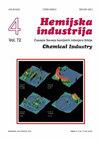用新型中温细菌菌株接种混合草本废弃物堆肥提高施肥效果
IF 0.8
4区 工程技术
Q4 ENGINEERING, CHEMICAL
引用次数: 5
摘要
在混合药用植物废弃物中加入链霉菌属、Paenybacillus属、芽孢杆菌属和膜杆菌属的新菌株进行堆肥。在堆肥后的164 d内,对C/N比、有机质损失量、磷和钾含量、CO 2生成和脱氢酶活性等化学和生物学参数进行了评价。所选的中温细菌发酵剂有可能显著缩短混合草本废弃物的分解周期,从6个月左右减少到2.5个月左右。通过对四种植物(Fagopirum esculentum、thyymus vulgaris、Cynara scolimus和Lavandula officinalis)种子萌发指数的分析,发现堆肥对四种植物的萌发和根茎生长均有促进作用。所有被试物种在成熟接种堆肥上的发芽指数比对照堆肥平均高60%。研究表明,在草本废弃物中添加中温发酵剂可以加快废弃物的分解速度,提高堆肥的生物肥效。本文章由计算机程序翻译,如有差异,请以英文原文为准。
Enhanced fertilization effect of a compost obtained from mixed herbs waste inoculated with novel strains of mesophilic bacteria
Mixed medicinal plant waste was composted with addition of novel bacterial strains belonging to the genera Streptomyces, Paenybacillus, Bacillus and Hymenobacter . The composting was followed by assessment of chemical and biological parameters including C/N ratio, loss of organic matter, phosphorous and potassium content as well as CO 2 generation and dehydrogenase activity during 164 days. The selected mesophilic bacterial starters had a potential to significantly reduce the period of mixed herb waste decomposition, from about 6 months to about 2.5 months. Based on the seed germination index of four plants ( Fagopirum esculentum, Thymus vulgaris, Cynara scolimus and Lavandula officinalis ) the germination and radial root growth of the investigated plants was improved by the inoculated compost. The germination index of all tested species on the mature inoculated composts was in average 60% higher compared to the control compost. The research indicates that the mesophilic starter addition into the herbs waste can contribute to the speed of waste decomposition and lead to the improvement of biofertilization effect of the obtained compost.
求助全文
通过发布文献求助,成功后即可免费获取论文全文。
去求助
来源期刊

Hemijska Industrija
工程技术-工程:化工
CiteScore
1.60
自引率
11.10%
发文量
12
审稿时长
6-12 weeks
期刊介绍:
The Journal Hemijska industrija (abbreviation Hem. Ind.) is publishing papers in the field of Chemical Engineering (Transport phenomena; Process Modeling, Simulation and Optimization; Thermodynamics; Separation Processes; Reactor Engineering; Electrochemical Engineering; Petrochemical Engineering), Biochemical Engineering (Bioreactors; Protein Engineering; Kinetics of Bioprocesses), Engineering of Materials (Polymers; Metal materials; Non-metal materials; Biomaterials), Environmental Engineeringand Applied Chemistry. The journal is published bimonthly by the Association of Chemical Engineers of Serbia (a member of EFCE - European Federation of Chemical Engineering). In addition to professional articles of importance to industry, scientific research papers are published, not only from our country but from all over the world. It also contains topics such as business news, science and technology news, information on new apparatus and equipment, and articles on environmental protection.
 求助内容:
求助内容: 应助结果提醒方式:
应助结果提醒方式:


